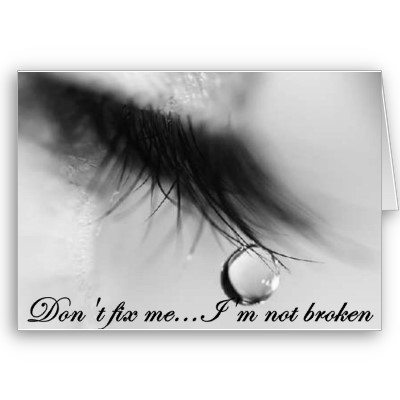We’ve all had those days. You know the ones. When our emotions feel, well, bigger. We might chalk it up to being run down or exhausted. Then trudge through our day hoping to avoid everyone, in it. Have you ever pasted on the ‘I’m fine,’ smile? It feels so wrong, and yet, aren’t we trained to do it? Cheery chit chat, when you’re feeling anything but, is just weird.
There’s a time and a place for everything, but when you’re a recovering addict, stuffing your feelings is dangerous!
Why is it, when I’m not okay, I feel, like I should be? Where did I get this message? We’re not robots. Intellectually, I know it’s perfectly normal to not be okay and yet, my mind still messes with me.
These are the days I tend to be more, inward. Maybe it’s the inner dialogue running in endless, noisy loops that’s really the problem. It goes something like this: Your hair is ugly. Those pants look awful on you. You don’t have time to make your bed. Why is everything so hard? Man I’m tired. Am I walking under water? I don’t want to go to work today. Did I sleep last night?
Uncomfortable emotions are part of our makeup. I know this. I even accept it, on good days. I’ve learned that by avoiding feelings, I get into big trouble. Still, on those rough days, I am so tempted to paste on that smile. It’s almost, second nature.
Thankfully, I have a few good people in my life that I can talk to. I mean really talk, too.
The kind of talk that goes something like this – I’m having a rough day. My brain won’t shut up and I feel like shit.
You have to be careful who you disclose this to. There are two types of responses, you might get back. First is the awkward silence, which leaves you and them, feeling embarrassed. Second, and this one drives me nuts, is when the person I’m talking with tries to fix me. As if me, having a human experience, is somehow strange or shameful. We’re told to cheer up, or practice gratitude. Why? Why should anyone force themselves to feel something, they don’t? Is that even possible?
Let’s face it. Watching someone struggle emotionally, is uncomfortable.
When you encourage someone to feel better, the message you’re sending, is this – the feelings you’re having aren’t good. Pick better ones. Ones that can make us both feel good.
We have hundreds of emotions, but most of us stick to these five.
Good.
Bad.
Not too bad
Alright
Okay
Strangely enough, these five aren’t feelings, they’re judgements.
When we stop judging the way we feel, we have grown up, emotionally.
Addiction starts as a feelings dis-ease.
Recovering addicts learn early on, how important it is to truthfully, share their feelings. Feelings that aren’t shared or debriefed become actions. These actions can lead to relapse.
I’ve spoken with many addicts who say, “I’m not getting anything out of these meetings.” When asked if they shared, their response was no. Rather than share at the meetings, they stop going. Another scenario is an argument with a family member, or friend. Rather than voice their true feelings, they stuff them and then feel resentful. From there they fall back into old, unhealthy behaviours (isolating, case building and feeling sorry for themselves) and eventually, relapse.
We can only hold our breath for so long, before the fallout happens.
In talking with someone who gets this, someone who is also willing to be real, I learn that my rough day – the brain noise and feeling like shit – are just other words, for shame.
Shame is like taxes. You can pay it down, but it won’t stay gone.
In rehab, I found out I’m shame based.
Shame is different than guilt. Guilt says I made a mistake.
Shame says I am one.
Shame is an emotion and a big fat liar. Emotions are always changing. A rough moment can turn into a bonding experience, when shared with the right person.
Many of us yearn for intimacy. Yet when we’re offered it, we can’t handle it. Intimacy – into me you see, allows us to be vulnerable with one another. It’s a partnership. Not a one way street.
Becoming emotionally fluent is the most difficult task any addict will face, when recovering from addiction. Emotions arrest at the time, using first begins.
You can imagine a forty year old man, who first started using at fourteen. He might look all grown up, but inside, he’s still a scared little kid.
The next time you’re trying to make someone else feel better stop and ask yourself this question. What am I feeling right now? If you’re uncomfortable, chances are you’re not helping the person in front of you. What you’re really doing, is avoiding your emotions.
When you recognize this, it can be a game changer. Instead of trying to fix them, share how difficult it is for you. Now you’re on equal footing. This will bring your relationship to a whole new level.
Recovery is more than just living abstinent free. It’s about healthy relationships. Families can repair much of the damage done, when everyone is willing to communicate on a feelings level.
We all have our answers. Sometimes, we just need someone who will listen, to figure them out.
If you or someone you love needs help, please call this confidential support line assistance. 844-470-0410.


